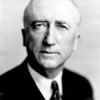James F. Byrnes

James F. Byrnes
James Francis Byrneswas an American politician from the state of South Carolina. During his career, Byrnes served as a U.S. Representative, a U.S. Senator, a Justice of the Supreme Court, Secretary of State, and 104th governor of South Carolina. He is one of very few politicians to serve in all three branches of the American federal government while also being active in state government. He was a confidant of U.S. President Franklin D. Roosevelt, and was one of the most...
NationalityAmerican
ProfessionPolitician
Date of Birth2 May 1879
CountryUnited States of America
The carrying out of the Potsdam Agreement has, however, been obstructed by the failure of the Allied Control Council to take the necessary steps to enable the German economy to function as an economic unit.
We intend to continue our interest in the affairs of Europe and of the world.
Too many people are thinking of security instead of opportunity. They seem more afraid of life than death.
We favor the economic unification of Germany. If complete unification cannot be secured, we shall do everything in our power to secure the maximum possible unification.
Power intoxicates men. When a man is intoxicated by alcohol, he can recover, but when intoxicated by power, he seldom recovers.
Essential central German administrative departments have not been established, although they are expressly required by the Potsdam Agreement.
That's when I realized my house was gone.
We did not anticipate the end of days.
We have helped to organize the United Nations. We believe it will stop aggressor nations from starting wars. Because we believe it, we intend to support the United Nations organization with all the power and resources we possess.
I know for a fact my house is gone.
I hope that the German people will never again make the mistake of believing that because the American people are peace-loving, they will sit back hoping for peace if any nation uses force or the threat of force to acquire dominion over other peoples and other governments.
I have come to Germany to learn at first hand the problems involved in the reconstruction of Germany and to discuss with our representatives the views of the United States Government as to some of the problems confronting us.
What we want is a lasting peace. We will oppose soft measures which invite the breaking of the peace.
That was the principle of reparations to which President Truman agreed at Potsdam. And the United States will not agree to the taking from Germany of greater reparations than was provided by the Potsdam Agreement.